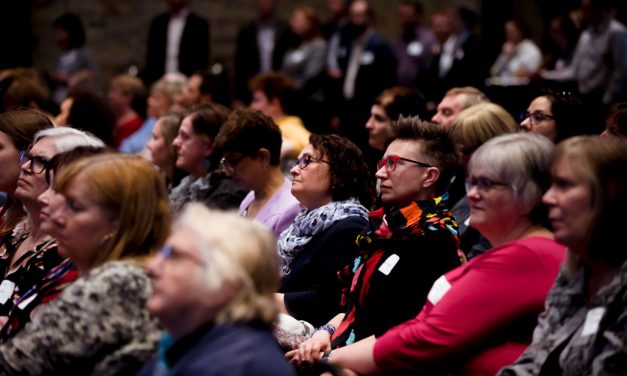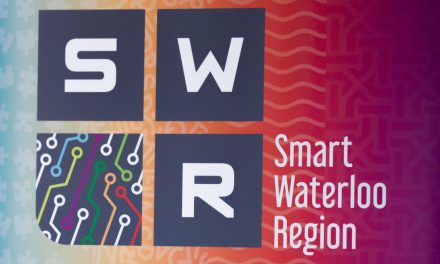To the members of the youth panel advising the Waterloo Region Smart Cities Challenge team, it doesn’t matter that their entry didn’t win the $50-million commitment of federal funds on Tuesday.
What matters is that hundreds of people and dozens of agencies have been energized by the Smart Waterloo Region proposal to make this area a national example for child and youth well-being.
Olivier Szczepaniak, student body president at Kitchener’s Resurrection Catholic Secondary School, spoke for 10 energized youth panel members when he said: “I think the best part about losing is now that we can scale it sustainably ... Sometimes, when you have so much money, you say, ‘Oh well, we have it, we might as well spend it.’
“But now we have to think critically about our decisions and make sure that in the long run, we’ll going to do absolutely the best for our community.”
Szczepaniak was among the 150 people in a standing-room-only crowd at The Tannery at Communitech to witness the live-streamed announcement from Ottawa of the four winning entries in Infrastructure Canada’s Smart Cities Challenge.
The Challenge, launched 18 months ago, was open to any urban, rural or Indigenous community in Canada, to identify and tackle big problems in their community, using collaboration and technology to create solutions that could be scalable to the rest of the country.

The scene at the Tannery Event Centre. (Communitech photo: Sara Jalali)
A bid by Guelph and Wellington County won one of two $10 million prizes, for its plan to create a “Circular Food Economy,” where all citizens have food security, and where food waste is seen as a resource.
In the broadcast from Ottawa, Guelph Mayor Cam Guthrie said the Challenge was the inspiration to get academics, businesspeople and innovators — “all these great brains” — in the same room to discuss how to reduce society’s food footprint. The resulting vision won $10 million spread over five years. Guthrie said his community’s project is going to leave a legacy “... not just for the City of Guelph, not just for the Province of Ontario, and not just for our country, but for the entire world, when it comes to food.”
The communities of Nunavut won the second $10 million prize, for their plan to combat suicide in the Arctic. The Nova Scotia town of Bridgewater won $5 million to eliminate energy poverty.
Waterloo Region was the smallest of the communities in the $50 million “large city” category, facing Edmonton, Quebec City, Surrey/Vancouver, Greater Victoria and the winner, Montreal, whose bid targeted urban mobility and access to food.
The Waterloo Region bid to use “early intervention, youth engagement and a connected-community framework” to focus on four key areas — early childhood development, literacy, mental health and sense of belonging — had a momentum bigger than its regional boundaries. It caught the attention of UNICEF Canada, the Ontario Ministry of Education and some 100 community partners, including all municipal governments and school boards in the region, tech innovators, community philanthropists, and nonprofits, including YMCAs in five provinces. And it attracted $105 million in pledges of funding or in-kind support, although some may have been dependent on the anticipated federal commitment.
The local politicians didn’t seem shaken by losing out to Montreal.

(Communitech photo: Sara Jalali)
North Dumfries Mayor Sue Foxton said before the announcement that “win or lose, we will advance forward and leverage what we have learned over the last 18 months.” And after the announcement, she doubled down, saying: “We have to go forward. How can we leave our youth behind? ... It’s not a matter of if, it’s when. It starts now. Now we start building.”
Kitchener Mayor Berry Vrbanovic said the regional application “has brought together all these community partners that I believe will move forward with this initiative, regardless. This community has a history of taking great ideas and figuring out a way to make them happen.”
Waterloo Mayor Dave Jaworsky agreed. Referencing the upcoming True North 2019 conference, he said the bid was using tech to solve a social sector problem: “We use tech for good.” And after the announcement of the winners, he was confident: “There’s really no stopping us. Once you have 200 people working together, it’s really hard to stop it. Certainly, $50 million would have been incredible for moving us forward, but we’re going to move forward nonetheless, because children and youth are the future of our community.”
Some aspects of the bid have already been tested in the community.
Smart Waterloo Region lead Matthew Chandy, who was in Ottawa with the regional team, said in an earlier interview with Communitech’s Craig Daniels that the local bid leveraged the tech-savvy thinkers of the area, and used the connections offered by Communitech, because central to the plan is a community-based data platform that will connect organizations that support children and youth.
“We have over 35 tech solutions that we’ve outlined in the proposal. Some of those tech solutions were already being piloted in our community by certain service delivery providers.”
At the announcement wrap-up, Waterloo Region Chief Administrative Officer Mike Murray said that once the team members return from Ottawa, “We now have an opportunity to find ways forward. The team will reconnect and decide where do we go from here.”
– With files from Craig Daniels

